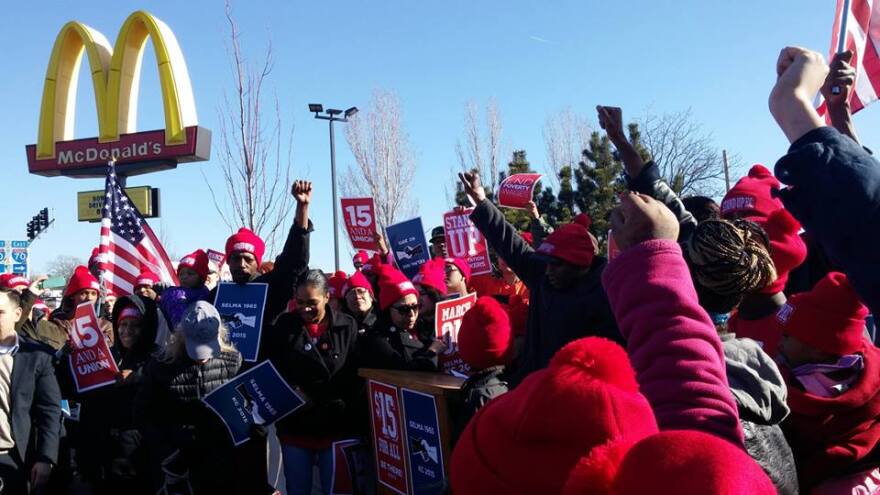The Kansas City Council passed an ordinance earlier this summer that would've raised the city's minimum wage to $13 an hour by 2020. And while the move was praised by social justice organizations and workers, many business groups felt it was done too quickly.
In the weeks since then, a lot has changed with the minimum wage debate in Kansas City. Competing initiatives, an election and state law have all converged into a confusing mess.
To straighten out the tangle of procedures and petitions, KCUR has put together a timeline of the major developments surrounding the minimum wage. This isn't an exhaustive list, but it is our best effort to compile the significant dates and moments in the minimum wage conversation in Kansas City.
May 6, 2014 — Three hundred members of faith-based group Missouri Faith Voices march to Jefferson City to call on the Missouri General Assembly to expand Medicaid, welfare benefits and the state's minimum wage. Twenty-three members of the group are arrested for singing and praying in the Senate Gallery.
Members of the Southern Christian Leadership Conference of Greater Kansas City (SCLC) are among the protesters.
January, 2015 — The SCLC starts looking into ways to pass local minimum wage ordinances in Kansas City. They begin gathering signatures for an initiative petition in the following months. Meanwhile, activists and low-wage workers with the activist group Stand Up KC continue to protest outside local restaurants for a wage increase.
May 6, 2015 — The petitioners submit the initiative with more than 4,000 signatures to the city council. The initiative calls for a election to let Kansas City voters decide on a $15 an hour minimum wage by 2020.
May 21, 2015 — The council declines to put the SCLC's petition on an August ballot. Instead, Mayor Sly James and the council vow to pass an ordinance themselves. They did so out of concern for local businesses and business groups.
The council initially took up the issue because of a pending state law called House Bill 722, which would've banned local wage ordinances, but not if they were in effect before Aug. 28, 2015. Previous state law also banned local wage hikes, but a challenge in 1998 led some to think it wasn't effective.
July 9, 2015 — Members of Stand Up KC camp outside City Hall in anticipation of the council's vote on the minimum wage. Many members fast for hours to symbolize the hardships they face under Missouri's $7.65 minimum wage.
July 10, 2015 — Missouri Gov. Jay Nixon vetoes HB 722. "House Bill No. 722 is a clear example of unwarranted government intrusion," Nixon wrote in his veto letter. "Because I support local control, I will not approve."
July 16, 2015 — After two months of testimony and meetings, the council votes 12-1 on an ordinance raising the city's minimum wage to $8.50 an hour by Aug. 24, and $13 by 2020. The move was met with significant support by social justice organizations.
July 28, 2015 — Missourians for Fair Wages, a coalition of business groups, submits 100 signatures to the City Clerk's office for a referendum vote on the council's ordinance. They have until Aug. 25 to collect 3,417 signatures. The referendum effectively blocks the council's ordinance from going into effect by the deadline outlined by HB 722.
Aug. 20, 2015 — The SCLC demands the council place their $15 an hour petition on a Nov. 3 ballot. The council is forced to do so under city charter because the petitioners had enough signatures and the council didn't technically act on the original initiative.
Aug. 21, 2015 — Missourians for Fair Wages submits more than 6,000 signatures to the City Clerk's office for their referendum. The issue is unlikely to be put on a ballot, as the city's ordinance was blocked from going into effect.
Aug. 28, 2015 — The deadline outlined by HB 722 comes and goes. The city's ordinance is essentially dead because it didn't go into effect in time.
What's next? — The Legislature could override Gov. Jay Nixon's veto of HB 722. If that happens, the city council will likely try to scrap the initiative vote through an escape clause added into the initiative petition language.
City Attorney Bill Geary admitted to the council that the Jackson County Election Board could reject the attempt, causing the city to lose $500,000 on an election that would be illegal under state law.
If HB 722 is not overridden, then the situation becomes more complicated. If Kansas City voters approve the initiative, the state would likely still claim that the city does not have the authority to raise the minimum wage above state levels. The issue could be taken to court if the state decides to pursue legal action against Kansas City.






